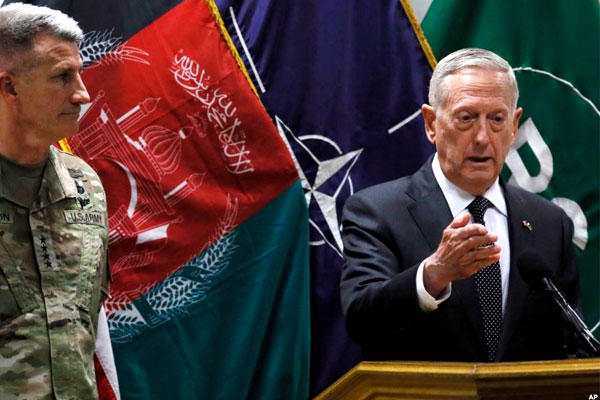The Pentagon's top leader says officials are still mulling the proper strategy in Afghanistan to avoid rash decisions that could hurt the United States and its allies in the long run.
"Welcome to strategy," Defense Secretary Jim Mattis said Friday. He had stopped in to speak with Pentagon reporters before a meeting with Secretary of State Rex Tillerson to further discuss options in Syria.
Mattis said he's listening to all options and wrapping everything "under a regional context."
"This is hard, and there's a reason we got into some wars in our nation's history and didn't know how to end them. This is hard work and, if anyone else says otherwise, [he] is either somebody who didn't have to deal with it or deal with the consequences of the decisions of it," he said.
A formal strategy was expected to be announced in mid-July. Mattis didn't specify a new date.
In recent weeks, top aides have told various news outlets that roughly 3,500 to 5,000 additional U.S. troops are needed in Afghanistan, where the U.S. has had a significant footprint for more than a decade.
The defense secretary cautioned that the final decision has not been made.
"You want to get this thing right, so no, it's not finalized yet," he said.
Mattis also addressed a recent New York Times report that advisers from the White House have approached former leading military contractors such as Erik Prince, founder of Blackwater, to weigh in on the Afghanistan decision.
When asked of his thoughts on Prince's proposal, the defense secretary said, "I listen to everybody who's got an idea that I think I might find value from, and there [are] themes consistent from a number of people, a number of advisers, and there's things that we will incorporate and there's things we won't.
"Right now, I don't want to go any deeper than that," he said.
The Pentagon and White House have drawn scrutiny from a number of critics in Washington who say a new Afghanistan strategy must happen sooner rather than later because lives are on the line.
In June, President Donald Trump delegated full authority to Mattis to make the final call on the U.S. troop presence in America's longest war.
That same month, three U.S. soldiers were killed and one wounded in an Afghan insider attack in the Achin District of Nangarhar Province. A week later, seven American soldiers were wounded in a separate insider attack at Camp Shaheen, in the northern city of Mazar-i-Sharif.
Senate Armed Services Committee Chairman Sen. John McCain has said if officials do not drum up an Afghanistan review soon, Congress may need to step in.
Six "months into the new administration, it still has not delivered a strategy," McCain, R-Ariz., said in a statement last month. "We cannot keep going like this. If the administration fails to develop a strategy for success, Congress will need to play a greater role."
When asked if Mattis feels similar frustrations, the former Marine general said, "I'm just not paid for frustration, I'm paid to get the job done."
-- Oriana Pawlyk can be reached at oriana.pawlyk@military.com. Follow her on Twitter at @Oriana0214.
Related Video:





























